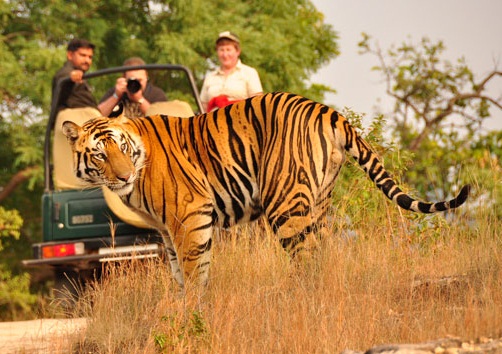
野外游会“驯化”野生动物
Wildlife Tourism Could Be "Domesticating" Wild Animals
野外游会“驯化”野生动物
Human tourism—no matter how well-intentioned—might desensitize wild animals to poachers and predators, affecting their odds of survival.
无论本意多么好,人类的旅游业都可能会使得动物对于靠近者与捕食者的警觉性下降,降低他们生存的几率。
撰文/播音 Christopher Intagliata
翻译 M
审校 邰伦玥
Wilderness protected areas get eight billion visitors a year. And that's just on land. Underwater reserves add millions more to the tally. Which, considering these are "protected" areas, seems like an insane number of people.
每年,前往野生保护区的游客有80亿人次。这仅仅是陆上的景点。水下保护区还要更多数百万人次。考虑到这些都是“保护”区,这样多的人流简直是不可思议。
"It is insane." Dan Blumstein, a behavioral and conservation biologist at U.C.L.A. "Now remember some of these might be local parks. But a lot of people are going and seeking out natural areas annually around the world. And therefore the potential impact of this can be quite large."
“真是太可怕了。”丹·姆斯坦,来自加州大学洛杉矶分校的行为与保育生态学家。“尽管这些景点中部分可能是当地的公园。但每年,很多人都在全球范围寻找自然区游览。因此,这种人流的潜在影响可能是巨大的。”
And the potential impact, to put it bluntly: "you know, does ecotourism make animals dumb?" Or, in other words: could our presence disrupt and change the instincts of wild animals, and ultimately, affect their survival? Blumstein and his colleagues surveyed literature on human-wildlife interactions all over the world, from chimpanzee ecotourism in Uganda, to elk and antelope gawking in the Grand Tetons. And they concluded that human tourism—no matter how well intentioned—might desensitize animals. Making them easier prey for poachers and predators.
说白了,这些潜在的影响就是:“生态旅游会不会使动物变得迟钝?”或者换一种说法:我们的出现会不会扰乱并改变野生动物的天性,并最终影响到他们的生存?姆斯坦和他的同僚通过文献调查,对全球的人类-野生动物互动进行研究。这些文献囊括了乌干达的猩猩生态游、大提顿公园的麋鹿与羚羊观赏等等。他们总结出,无论人类旅游的本意有多好,都可能会使动物对于靠近者与捕食者的警觉性下降,降低他们生存的几率。
A couple of mechanisms could be in play. There's what's called the "human shield" effect—predators are less likely to pounce when humans are around, making prey less vigilant, even after we leave. Or we might simply habituate prey to large noisy animals—like us—and thus render them more susceptible to predators later.
有多种机制造成了这种情况。其中一种称为“人盾”效应——当人类在场时,捕食者更少对猎物发动袭击。这使被捕食者的警觉性下降,哪怕是人类已经离开的时候。或者,我们的到来使得它们习惯了巨大吵闹的动物,于是对之后的捕食者就降低了警惕。
"It does seem that we may be, inadvertently or advertently, domesticating animals through tourism and wildlife tourism and ecotourism." The review is in the journal Trends in Ecology & Evolution. [Geffroy et al, How Nature-Based Tourism Might Increase Prey Vulnerability to Predators (link to come)]
“无论有意还是无意,我们好像通过野生动物旅游和生态游把动物驯化了。”这个观点发表在《生态学与进化趋势上》。
Now this paper isn't direct proof that tourism is actually desensitizing animals—it’s just a theory at this point. "What we have is we have all the pieces of the puzzle sort of lining up, and we articulate a pathway by which this could be an issue. Is it, and under what conditions? We don't know, and our paper really is a rallying cry for more research on the topic." Research that will hopefully give land managers the tools they need to convince us humans not to love the world's wildlife to death.
现在这篇文章并没有直接证明旅游业确实地使得动物变得迟钝,这仅仅是一种理论。“我们现在仅仅是把我们仅有的线索以一种方式串联起来,并以此提出一个可能存在的问题。是否真是这样,什么情况下会出现这种情况,我们并不清楚。我们的文章是希望可以吸引更多的研究者关注这个领域。”通过研究,希望能让土地管理者能够有理由说服人们:不要让人们对野生动物的爱毁了它们。
未经书面许可任何人不得复制或镜像
京ICP备11000850号-1
 京公网安备11010502039775号
京公网安备11010502039775号 信息网络传播视听节目许可证0111611号
国家科技基础条件平台

















